人教版(2019)必修 第二册Unit 4 History and traditions课文翻译 单元知识点汇总讲义
文档属性
| 名称 | 人教版(2019)必修 第二册Unit 4 History and traditions课文翻译 单元知识点汇总讲义 | 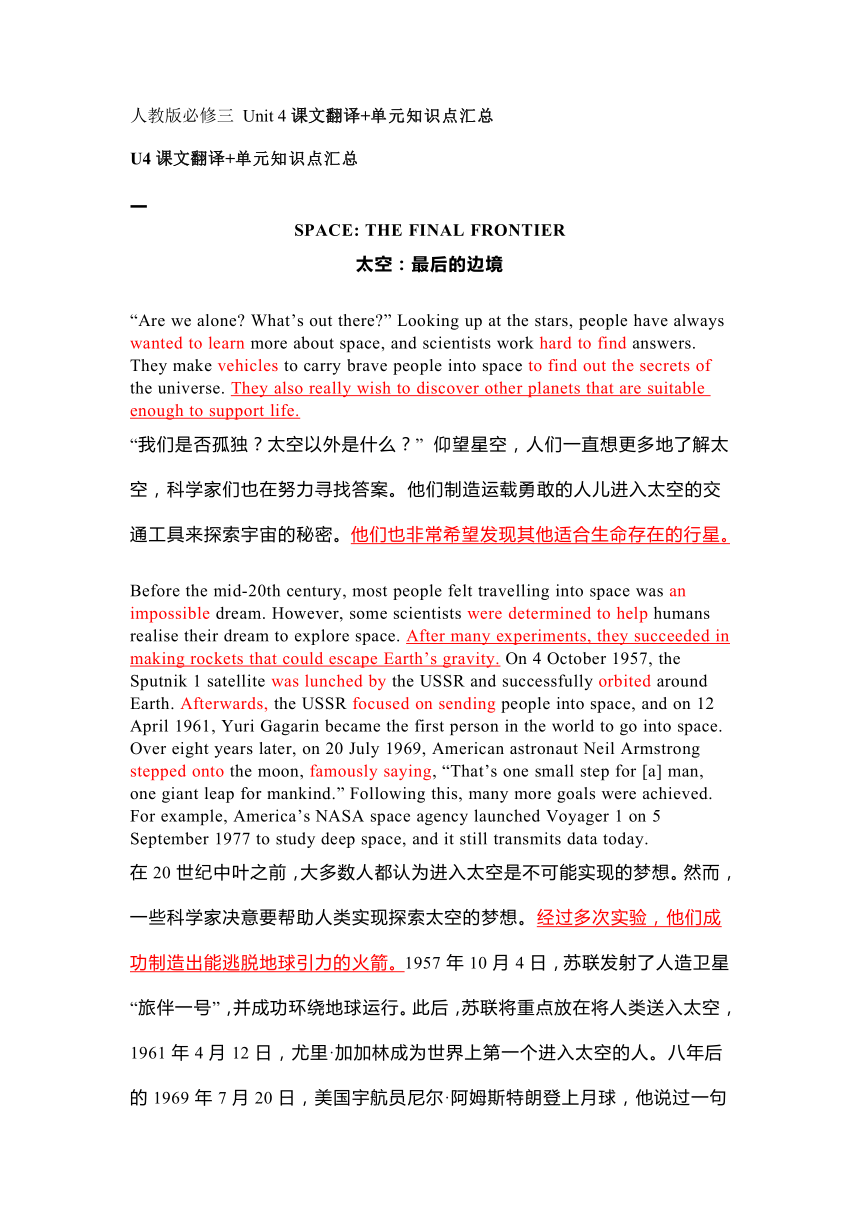 | |
| 格式 | docx | ||
| 文件大小 | 27.5KB | ||
| 资源类型 | 教案 | ||
| 版本资源 | 人教版(2019) | ||
| 科目 | 英语 | ||
| 更新时间 | 2024-02-28 20:28:23 | ||
图片预览

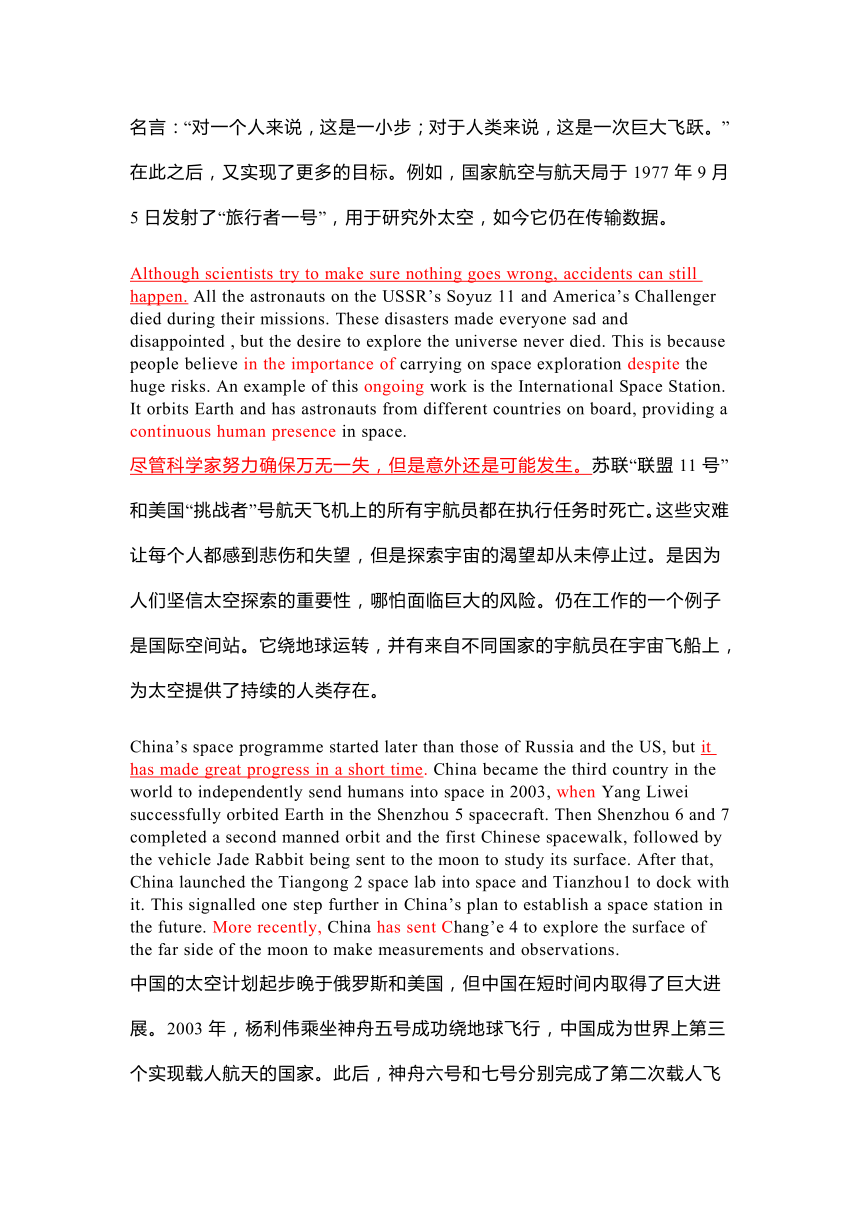
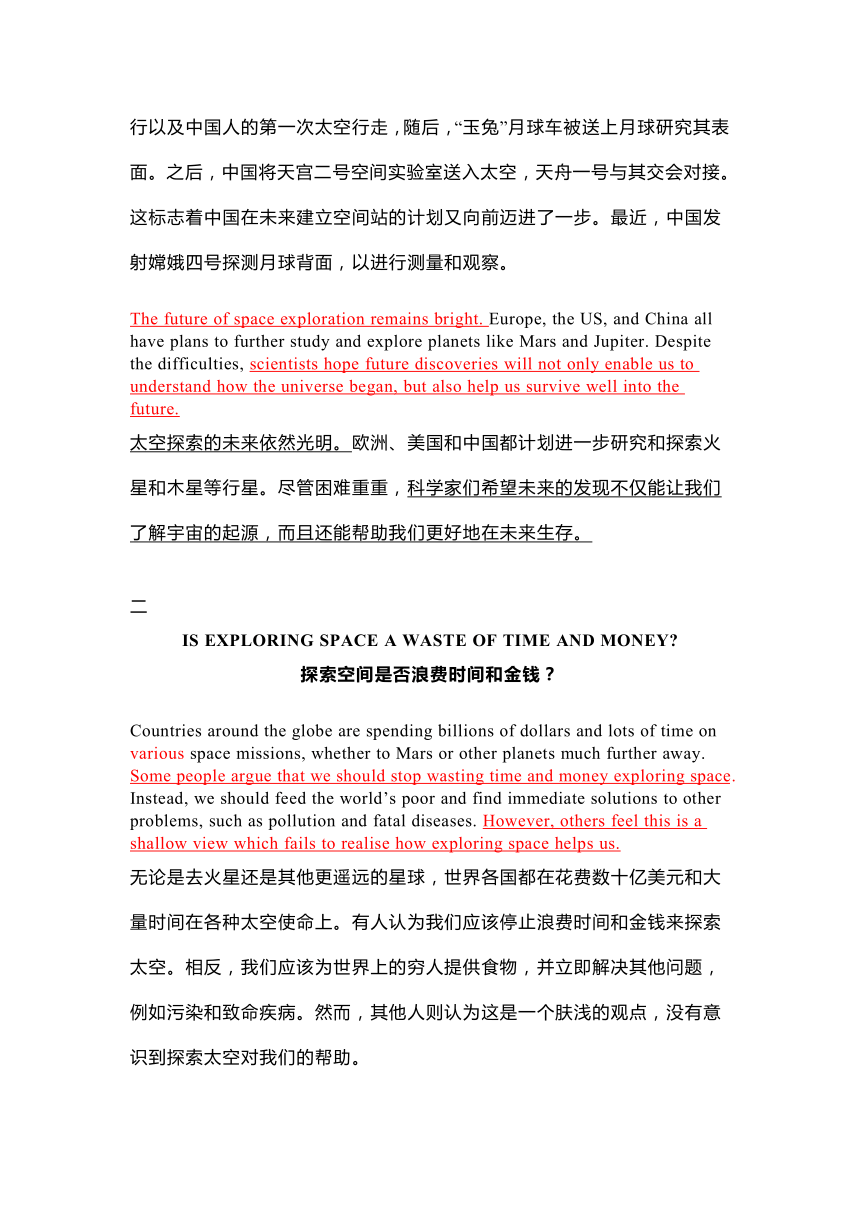
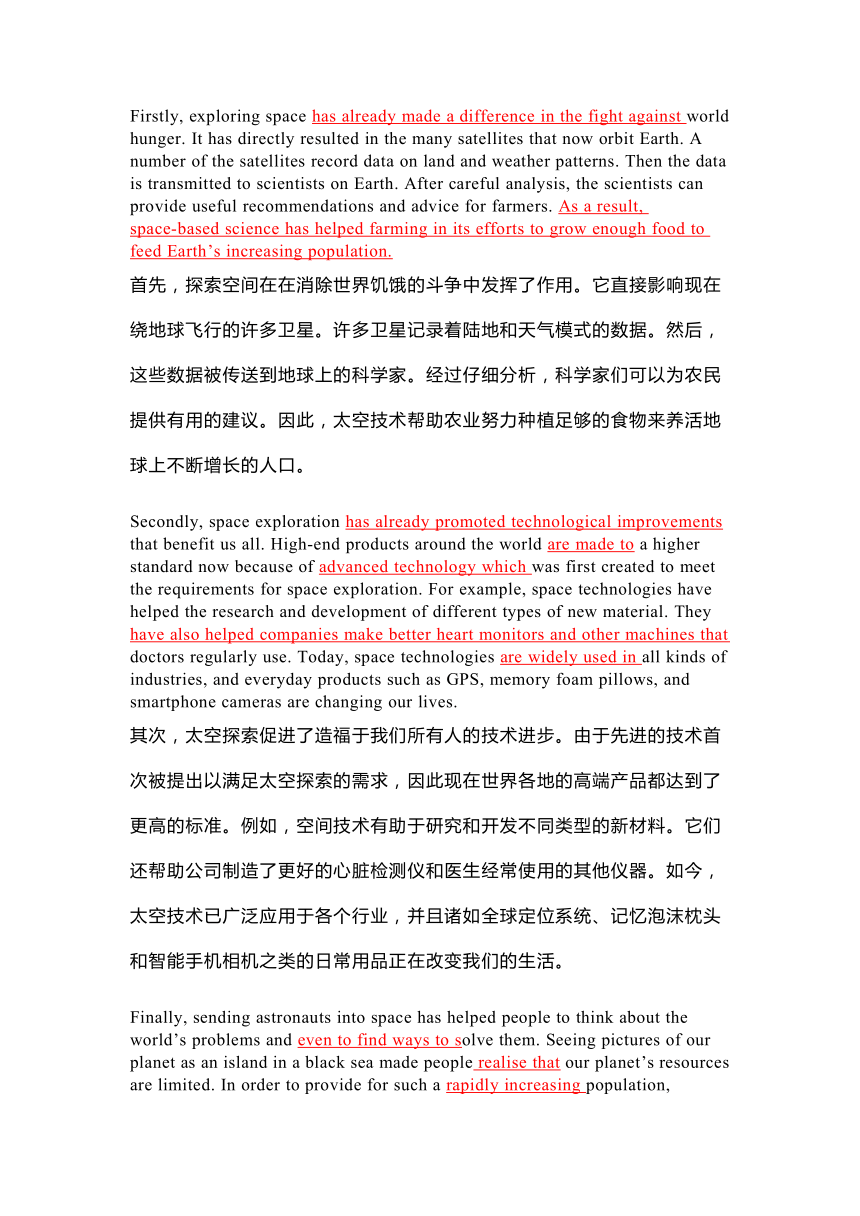
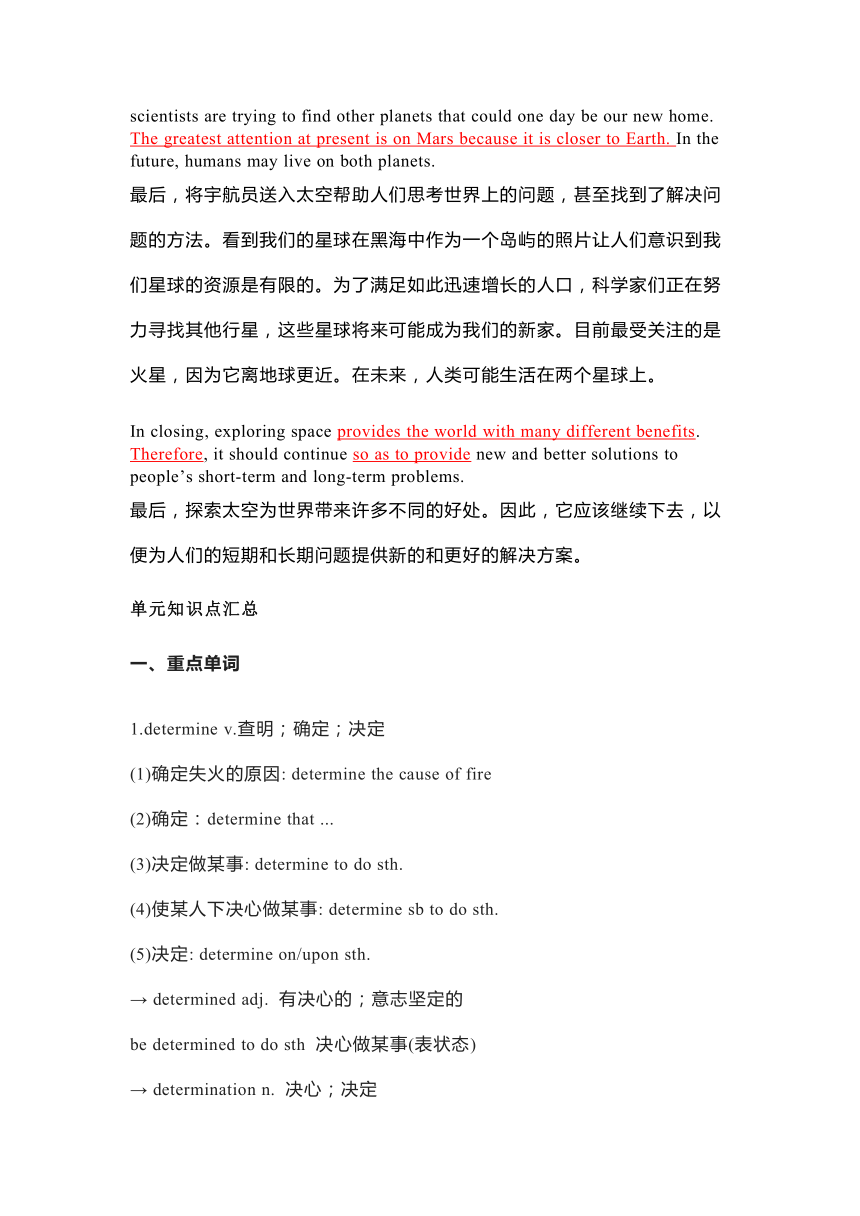
文档简介
人教版必修三 Unit 4课文翻译+单元知识点汇总
U4课文翻译+单元知识点汇总
一
SPACE: THE FINAL FRONTIER
太空:最后的边境
“Are we alone What’s out there ” Looking up at the stars, people have always wanted to learn more about space, and scientists work hard to find answers. They make vehicles to carry brave people into space to find out the secrets of the universe. They also really wish to discover other planets that are suitable enough to support life.
“我们是否孤独?太空以外是什么?” 仰望星空,人们一直想更多地了解太空,科学家们也在努力寻找答案。他们制造运载勇敢的人儿进入太空的交通工具来探索宇宙的秘密。他们也非常希望发现其他适合生命存在的行星。
Before the mid-20th century, most people felt travelling into space was an impossible dream. However, some scientists were determined to help humans realise their dream to explore space. After many experiments, they succeeded in making rockets that could escape Earth’s gravity. On 4 October 1957, the Sputnik 1 satellite was lunched by the USSR and successfully orbited around Earth. Afterwards, the USSR focused on sending people into space, and on 12 April 1961, Yuri Gagarin became the first person in the world to go into space. Over eight years later, on 20 July 1969, American astronaut Neil Armstrong stepped onto the moon, famously saying, “That’s one small step for [a] man, one giant leap for mankind.” Following this, many more goals were achieved. For example, America’s NASA space agency launched Voyager 1 on 5 September 1977 to study deep space, and it still transmits data today.
在20世纪中叶之前,大多数人都认为进入太空是不可能实现的梦想。然而,一些科学家决意要帮助人类实现探索太空的梦想。经过多次实验,他们成功制造出能逃脱地球引力的火箭。1957年10月4日,苏联发射了人造卫星“旅伴一号”,并成功环绕地球运行。此后,苏联将重点放在将人类送入太空,1961年4月12日,尤里·加加林成为世界上第一个进入太空的人。八年后的1969年7月20日,美国宇航员尼尔·阿姆斯特朗登上月球,他说过一句名言:“对一个人来说,这是一小步;对于人类来说,这是一次巨大飞跃。”在此之后,又实现了更多的目标。例如,国家航空与航天局于1977年9月5日发射了“旅行者一号”,用于研究外太空,如今它仍在传输数据。
Although scientists try to make sure nothing goes wrong, accidents can still happen. All the astronauts on the USSR’s Soyuz 11 and America’s Challenger died during their missions. These disasters made everyone sad and disappointed , but the desire to explore the universe never died. This is because people believe in the importance of carrying on space exploration despite the huge risks. An example of this ongoing work is the International Space Station. It orbits Earth and has astronauts from different countries on board, providing a continuous human presence in space.
尽管科学家努力确保万无一失,但是意外还是可能发生。苏联“联盟11号”和美国“挑战者”号航天飞机上的所有宇航员都在执行任务时死亡。这些灾难让每个人都感到悲伤和失望,但是探索宇宙的渴望却从未停止过。是因为人们坚信太空探索的重要性,哪怕面临巨大的风险。仍在工作的一个例子是国际空间站。它绕地球运转,并有来自不同国家的宇航员在宇宙飞船上,为太空提供了持续的人类存在。
China’s space programme started later than those of Russia and the US, but it has made great progress in a short time. China became the third country in the world to independently send humans into space in 2003, when Yang Liwei successfully orbited Earth in the Shenzhou 5 spacecraft. Then Shenzhou 6 and 7 completed a second manned orbit and the first Chinese spacewalk, followed by the vehicle Jade Rabbit being sent to the moon to study its surface. After that, China launched the Tiangong 2 space lab into space and Tianzhou1 to dock with it. This signalled one step further in China’s plan to establish a space station in the future. More recently, China has sent Chang’e 4 to explore the surface of the far side of the moon to make measurements and observations.
中国的太空计划起步晚于俄罗斯和美国,但中国在短时间内取得了巨大进展。2003年,杨利伟乘坐神舟五号成功绕地球飞行,中国成为世界上第三个实现载人航天的国家。此后,神舟六号和七号分别完成了第二次载人飞行以及中国人的第一次太空行走,随后,“玉兔”月球车被送上月球研究其表面。之后,中国将天宫二号空间实验室送入太空,天舟一号与其交会对接。这标志着中国在未来建立空间站的计划又向前迈进了一步。最近,中国发射嫦娥四号探测月球背面,以进行测量和观察。
The future of space exploration remains bright. Europe, the US, and China all have plans to further study and explore planets like Mars and Jupiter. Despite the difficulties, scientists hope future discoveries will not only enable us to understand how the universe began, but also help us survive well into the future.
太空探索的未来依然光明。欧洲、美国和中国都计划进一步研究和探索火星和木星等行星。尽管困难重重,科学家们希望未来的发现不仅能让我们了解宇宙的起源,而且还能帮助我们更好地在未来生存。
二
IS EXPLORING SPACE A WASTE OF TIME AND MONEY
探索空间是否浪费时间和金钱?
Countries around the globe are spending billions of dollars and lots of time on various space missions, whether to Mars or other planets much further away. Some people argue that we should stop wasting time and money exploring space. Instead, we should feed the world’s poor and find immediate solutions to other problems, such as pollution and fatal diseases. However, others feel this is a shallow view which fails to realise how exploring space helps us.
无论是去火星还是其他更遥远的星球,世界各国都在花费数十亿美元和大量时间在各种太空使命上。有人认为我们应该停止浪费时间和金钱来探索太空。相反,我们应该为世界上的穷人提供食物,并立即解决其他问题,例如污染和致命疾病。然而,其他人则认为这是一个肤浅的观点,没有意识到探索太空对我们的帮助。
Firstly, exploring space has already made a difference in the fight against world hunger. It has directly resulted in the many satellites that now orbit Earth. A number of the satellites record data on land and weather patterns. Then the data is transmitted to scientists on Earth. After careful analysis, the scientists can provide useful recommendations and advice for farmers. As a result, space-based science has helped farming in its efforts to grow enough food to feed Earth’s increasing population.
首先,探索空间在在消除世界饥饿的斗争中发挥了作用。它直接影响现在绕地球飞行的许多卫星。许多卫星记录着陆地和天气模式的数据。然后,这些数据被传送到地球上的科学家。经过仔细分析,科学家们可以为农民提供有用的建议。因此,太空技术帮助农业努力种植足够的食物来养活地球上不断增长的人口。
Secondly, space exploration has already promoted technological improvements that benefit us all. High-end products around the world are made to a higher standard now because of advanced technology which was first created to meet the requirements for space exploration. For example, space technologies have helped the research and development of different types of new material. They have also helped companies make better heart monitors and other machines that doctors regularly use. Today, space technologies are widely used in all kinds of industries, and everyday products such as GPS, memory foam pillows, and smartphone cameras are changing our lives.
其次,太空探索促进了造福于我们所有人的技术进步。由于先进的技术首次被提出以满足太空探索的需求,因此现在世界各地的高端产品都达到了更高的标准。例如,空间技术有助于研究和开发不同类型的新材料。它们还帮助公司制造了更好的心脏检测仪和医生经常使用的其他仪器。如今,太空技术已广泛应用于各个行业,并且诸如全球定位系统、记忆泡沫枕头和智能手机相机之类的日常用品正在改变我们的生活。
Finally, sending astronauts into space has helped people to think about the world’s problems and even to find ways to solve them. Seeing pictures of our planet as an island in a black sea made people realise that our planet’s resources are limited. In order to provide for such a rapidly increasing population, scientists are trying to find other planets that could one day be our new home. The greatest attention at present is on Mars because it is closer to Earth. In the future, humans may live on both planets.
最后,将宇航员送入太空帮助人们思考世界上的问题,甚至找到了解决问题的方法。看到我们的星球在黑海中作为一个岛屿的照片让人们意识到我们星球的资源是有限的。为了满足如此迅速增长的人口,科学家们正在努力寻找其他行星,这些星球将来可能成为我们的新家。目前最受关注的是火星,因为它离地球更近。在未来,人类可能生活在两个星球上。
In closing, exploring space provides the world with many different benefits. Therefore, it should continue so as to provide new and better solutions to people’s short-term and long-term problems.
最后,探索太空为世界带来许多不同的好处。因此,它应该继续下去,以便为人们的短期和长期问题提供新的和更好的解决方案。
单元知识点汇总
一、重点单词
1.determine v.查明;确定;决定
(1)确定失火的原因: determine the cause of fire
(2)确定:determine that ...
(3)决定做某事: determine to do sth.
(4)使某人下决心做某事: determine sb to do sth.
(5)决定: determine on/upon sth.
→ determined adj. 有决心的;意志坚定的
be determined to do sth 决心做某事(表状态)
→ determination n. 决心;决定
2.disappointed adj. 失望的;沮丧的
(1)对某事感到失望: be disappointed at/by sth
(2)对某人感到失望: be disappointed with/in sb
(3)因做某事而感到失望: be disappointed to do sth
(4)因......而感到失望: be disappointed that ...
→disappoint vt. 使失望
→disappointment n. 失望
令某人失望的是: to one’s disappointment
→disappointing adj. 令人失望的
→disappointedly adv. 失望地
3.independent adj. 独立的;自立的
independently adv. 独立地;自立地
(1)独立的国家: an independent country
(2)变得独立: become independent
(3)使某人自立: make sb independant
(4)不依赖: be independent of
→ independently adv. 独立地;自立地
→ independence n. 独立(之日);自主;自立
4.lack vt. 没有;缺乏
(1)缺乏信心:lack confidence
lack n. 缺乏;短缺
(1)不乏某物: no lack for...
(2)缺乏......:lack of ...
(3)因缺乏......: for lack of ...
(4)不乏......: there is no lack of ...
→ lacking adj. 缺乏的;短缺的
缺乏......: be lacking in
5.keen adj. 热衷的;渴望的
(1)渴望做某事: be keen to do sth
(2)对做某事着迷;热衷于做某事: be keen on sth
(3)渴望......(从句谓语常用should +do ath)be keen that
(4)对......有敏锐的眼光: have a keen eye for
→ keenly adv. 热切地
→ keenness n. 热切;渴望
6.argue vt/vi 论证;争辩;争论
(1)与某人争辩某事: argue with sb about/over sth
(2)提出理由支持、反对: argue for/against
(3)说服某人做某事、不做某事: argue sb into/out of doing sth
(4)为那位可怜的老人辩护:argue for the poor old man
(5)反对捕鲸: argue against hunting whales.
(6)主张......认为......;争辩道......argue that….
→ argument n. 争论;争吵;论点
have an argument with sb 与某人争吵
beyond argument 无可争辩
settle an argument 解决争端
7.regular adj.定期的;经常的;正常的
定期访问: regular visit
→ regularly adv. 经常;定期地
定期锻炼: take/do exercise regularly
8.attach vt. 系;绑;贴
(1)把......固定在/附在......上: attach ...to ...
(2)认为......很重要、重视......: attach importance to ...
→attached adj. 依恋的
be attached to ... 附属于......;依恋......
9.signal vt.& vi. 标志着;标明;发信号 n. 信号;标志
signal (to) sb to_do sth 示意某人做某事
signal (sb) that ... 发信号/示意……
a danger/warning signal 危险/警告信号
traffic signals 交通信号
a/the signal for ……的信号
send/give out a signal 发出信号
10.limited adj. 有限的
be limited to 受限于……
→limit v. 限制;限定
limit ... to 限制……在(……范围内)
→limit n. 限制;限度
set a limit to 限定范围在……
there is a/no limit_to……是有限/无限的
within limits 在某种程度上;有一定限制
二、重点短语
1.carry on 继续做,坚持做
(1)从事某事: carry sth
(2)继续某事: carry on with sth
(3)继续做某事: carry on doing sth.
2.on board 在宇宙飞船上;在船上;在飞机上
3.in the hope of doing sth 抱着做某事的希望
(1)抱着......的希望:in the hope that +从句
(2)希望做某事hope to do sth
(3)希望......hope that 从句
4.so as to do sth 为了;以便
5.弄懂;弄清楚;弄明白: figure out
(1)认为......figure that…
(2)身材好: have a good figure
6.result in ... 导致;造成
result from... 由……而引起的
as a result 结果(在句中作状语)
as a result of... 因为,由于(=because of)
without result 毫无结果,徒劳
7.run out 用完;耗尽(不及物)
用完、耗尽(及物): run out of
三、重点句式
1.非常......以至于......be+adj+enough to do
教材原句
(1)首先, 你必须足够聪明才能获得相关大学学位。
First of all, you must be intelligent enough to get a related college degree.
句式仿写
(2)他很强壮,能举起这个重箱子。
He was strong enough to lift the heavy box.
2.第一个做......、的......
教材原句
(1)尤里’加加林成为世界上第一个进入太空的人。
Yuri Gagarin became the first person in the world to go into space.
句式仿写
(2)安迪和鲁比累的喘不过气来, 他们第一登上了泰山。
Tired and short of breath, Andy and Ruby were the first to reach the top of Mount Tai.
3.This /that is because…..
(1)这是因为尽管存在巨大的风险,人们依然相信进行太空探索的重要性
This is because people believe in the importance of carrying on space exploration despite the huge risks.
(2)座头鲸有时被称为海洋的表演者。这是因为他们潜水时能做出令人印象深刻的动作。
Humpback whales are sometimes called performers of the ocean. This is because they can make impressive movements when they dive.
4.So that +目的状语从句
教材原句
在太空中,宇航员收集所有的脏水, 这样它们后期就可以循环利用了。
In space, astronauts collect all dirty water so that it can be recycled for later use.
句式仿写
他们决定为这项工程增加工人,以免被耽搁。
They decide to have more workers for the project so that it won’t be delayed.
5.It takes ….to do sth 花费......做某事
教材原句
1.......、到达离地球最近的行星----火星以及往返,需要两年多的时间。
It would take over two years to get to the closet planet, Mars, and back.
句式仿写
3.我花了很多的时间在网站上搜索有用的信息。
It took me much time to search for useful information on the website.
U4课文翻译+单元知识点汇总
一
SPACE: THE FINAL FRONTIER
太空:最后的边境
“Are we alone What’s out there ” Looking up at the stars, people have always wanted to learn more about space, and scientists work hard to find answers. They make vehicles to carry brave people into space to find out the secrets of the universe. They also really wish to discover other planets that are suitable enough to support life.
“我们是否孤独?太空以外是什么?” 仰望星空,人们一直想更多地了解太空,科学家们也在努力寻找答案。他们制造运载勇敢的人儿进入太空的交通工具来探索宇宙的秘密。他们也非常希望发现其他适合生命存在的行星。
Before the mid-20th century, most people felt travelling into space was an impossible dream. However, some scientists were determined to help humans realise their dream to explore space. After many experiments, they succeeded in making rockets that could escape Earth’s gravity. On 4 October 1957, the Sputnik 1 satellite was lunched by the USSR and successfully orbited around Earth. Afterwards, the USSR focused on sending people into space, and on 12 April 1961, Yuri Gagarin became the first person in the world to go into space. Over eight years later, on 20 July 1969, American astronaut Neil Armstrong stepped onto the moon, famously saying, “That’s one small step for [a] man, one giant leap for mankind.” Following this, many more goals were achieved. For example, America’s NASA space agency launched Voyager 1 on 5 September 1977 to study deep space, and it still transmits data today.
在20世纪中叶之前,大多数人都认为进入太空是不可能实现的梦想。然而,一些科学家决意要帮助人类实现探索太空的梦想。经过多次实验,他们成功制造出能逃脱地球引力的火箭。1957年10月4日,苏联发射了人造卫星“旅伴一号”,并成功环绕地球运行。此后,苏联将重点放在将人类送入太空,1961年4月12日,尤里·加加林成为世界上第一个进入太空的人。八年后的1969年7月20日,美国宇航员尼尔·阿姆斯特朗登上月球,他说过一句名言:“对一个人来说,这是一小步;对于人类来说,这是一次巨大飞跃。”在此之后,又实现了更多的目标。例如,国家航空与航天局于1977年9月5日发射了“旅行者一号”,用于研究外太空,如今它仍在传输数据。
Although scientists try to make sure nothing goes wrong, accidents can still happen. All the astronauts on the USSR’s Soyuz 11 and America’s Challenger died during their missions. These disasters made everyone sad and disappointed , but the desire to explore the universe never died. This is because people believe in the importance of carrying on space exploration despite the huge risks. An example of this ongoing work is the International Space Station. It orbits Earth and has astronauts from different countries on board, providing a continuous human presence in space.
尽管科学家努力确保万无一失,但是意外还是可能发生。苏联“联盟11号”和美国“挑战者”号航天飞机上的所有宇航员都在执行任务时死亡。这些灾难让每个人都感到悲伤和失望,但是探索宇宙的渴望却从未停止过。是因为人们坚信太空探索的重要性,哪怕面临巨大的风险。仍在工作的一个例子是国际空间站。它绕地球运转,并有来自不同国家的宇航员在宇宙飞船上,为太空提供了持续的人类存在。
China’s space programme started later than those of Russia and the US, but it has made great progress in a short time. China became the third country in the world to independently send humans into space in 2003, when Yang Liwei successfully orbited Earth in the Shenzhou 5 spacecraft. Then Shenzhou 6 and 7 completed a second manned orbit and the first Chinese spacewalk, followed by the vehicle Jade Rabbit being sent to the moon to study its surface. After that, China launched the Tiangong 2 space lab into space and Tianzhou1 to dock with it. This signalled one step further in China’s plan to establish a space station in the future. More recently, China has sent Chang’e 4 to explore the surface of the far side of the moon to make measurements and observations.
中国的太空计划起步晚于俄罗斯和美国,但中国在短时间内取得了巨大进展。2003年,杨利伟乘坐神舟五号成功绕地球飞行,中国成为世界上第三个实现载人航天的国家。此后,神舟六号和七号分别完成了第二次载人飞行以及中国人的第一次太空行走,随后,“玉兔”月球车被送上月球研究其表面。之后,中国将天宫二号空间实验室送入太空,天舟一号与其交会对接。这标志着中国在未来建立空间站的计划又向前迈进了一步。最近,中国发射嫦娥四号探测月球背面,以进行测量和观察。
The future of space exploration remains bright. Europe, the US, and China all have plans to further study and explore planets like Mars and Jupiter. Despite the difficulties, scientists hope future discoveries will not only enable us to understand how the universe began, but also help us survive well into the future.
太空探索的未来依然光明。欧洲、美国和中国都计划进一步研究和探索火星和木星等行星。尽管困难重重,科学家们希望未来的发现不仅能让我们了解宇宙的起源,而且还能帮助我们更好地在未来生存。
二
IS EXPLORING SPACE A WASTE OF TIME AND MONEY
探索空间是否浪费时间和金钱?
Countries around the globe are spending billions of dollars and lots of time on various space missions, whether to Mars or other planets much further away. Some people argue that we should stop wasting time and money exploring space. Instead, we should feed the world’s poor and find immediate solutions to other problems, such as pollution and fatal diseases. However, others feel this is a shallow view which fails to realise how exploring space helps us.
无论是去火星还是其他更遥远的星球,世界各国都在花费数十亿美元和大量时间在各种太空使命上。有人认为我们应该停止浪费时间和金钱来探索太空。相反,我们应该为世界上的穷人提供食物,并立即解决其他问题,例如污染和致命疾病。然而,其他人则认为这是一个肤浅的观点,没有意识到探索太空对我们的帮助。
Firstly, exploring space has already made a difference in the fight against world hunger. It has directly resulted in the many satellites that now orbit Earth. A number of the satellites record data on land and weather patterns. Then the data is transmitted to scientists on Earth. After careful analysis, the scientists can provide useful recommendations and advice for farmers. As a result, space-based science has helped farming in its efforts to grow enough food to feed Earth’s increasing population.
首先,探索空间在在消除世界饥饿的斗争中发挥了作用。它直接影响现在绕地球飞行的许多卫星。许多卫星记录着陆地和天气模式的数据。然后,这些数据被传送到地球上的科学家。经过仔细分析,科学家们可以为农民提供有用的建议。因此,太空技术帮助农业努力种植足够的食物来养活地球上不断增长的人口。
Secondly, space exploration has already promoted technological improvements that benefit us all. High-end products around the world are made to a higher standard now because of advanced technology which was first created to meet the requirements for space exploration. For example, space technologies have helped the research and development of different types of new material. They have also helped companies make better heart monitors and other machines that doctors regularly use. Today, space technologies are widely used in all kinds of industries, and everyday products such as GPS, memory foam pillows, and smartphone cameras are changing our lives.
其次,太空探索促进了造福于我们所有人的技术进步。由于先进的技术首次被提出以满足太空探索的需求,因此现在世界各地的高端产品都达到了更高的标准。例如,空间技术有助于研究和开发不同类型的新材料。它们还帮助公司制造了更好的心脏检测仪和医生经常使用的其他仪器。如今,太空技术已广泛应用于各个行业,并且诸如全球定位系统、记忆泡沫枕头和智能手机相机之类的日常用品正在改变我们的生活。
Finally, sending astronauts into space has helped people to think about the world’s problems and even to find ways to solve them. Seeing pictures of our planet as an island in a black sea made people realise that our planet’s resources are limited. In order to provide for such a rapidly increasing population, scientists are trying to find other planets that could one day be our new home. The greatest attention at present is on Mars because it is closer to Earth. In the future, humans may live on both planets.
最后,将宇航员送入太空帮助人们思考世界上的问题,甚至找到了解决问题的方法。看到我们的星球在黑海中作为一个岛屿的照片让人们意识到我们星球的资源是有限的。为了满足如此迅速增长的人口,科学家们正在努力寻找其他行星,这些星球将来可能成为我们的新家。目前最受关注的是火星,因为它离地球更近。在未来,人类可能生活在两个星球上。
In closing, exploring space provides the world with many different benefits. Therefore, it should continue so as to provide new and better solutions to people’s short-term and long-term problems.
最后,探索太空为世界带来许多不同的好处。因此,它应该继续下去,以便为人们的短期和长期问题提供新的和更好的解决方案。
单元知识点汇总
一、重点单词
1.determine v.查明;确定;决定
(1)确定失火的原因: determine the cause of fire
(2)确定:determine that ...
(3)决定做某事: determine to do sth.
(4)使某人下决心做某事: determine sb to do sth.
(5)决定: determine on/upon sth.
→ determined adj. 有决心的;意志坚定的
be determined to do sth 决心做某事(表状态)
→ determination n. 决心;决定
2.disappointed adj. 失望的;沮丧的
(1)对某事感到失望: be disappointed at/by sth
(2)对某人感到失望: be disappointed with/in sb
(3)因做某事而感到失望: be disappointed to do sth
(4)因......而感到失望: be disappointed that ...
→disappoint vt. 使失望
→disappointment n. 失望
令某人失望的是: to one’s disappointment
→disappointing adj. 令人失望的
→disappointedly adv. 失望地
3.independent adj. 独立的;自立的
independently adv. 独立地;自立地
(1)独立的国家: an independent country
(2)变得独立: become independent
(3)使某人自立: make sb independant
(4)不依赖: be independent of
→ independently adv. 独立地;自立地
→ independence n. 独立(之日);自主;自立
4.lack vt. 没有;缺乏
(1)缺乏信心:lack confidence
lack n. 缺乏;短缺
(1)不乏某物: no lack for...
(2)缺乏......:lack of ...
(3)因缺乏......: for lack of ...
(4)不乏......: there is no lack of ...
→ lacking adj. 缺乏的;短缺的
缺乏......: be lacking in
5.keen adj. 热衷的;渴望的
(1)渴望做某事: be keen to do sth
(2)对做某事着迷;热衷于做某事: be keen on sth
(3)渴望......(从句谓语常用should +do ath)be keen that
(4)对......有敏锐的眼光: have a keen eye for
→ keenly adv. 热切地
→ keenness n. 热切;渴望
6.argue vt/vi 论证;争辩;争论
(1)与某人争辩某事: argue with sb about/over sth
(2)提出理由支持、反对: argue for/against
(3)说服某人做某事、不做某事: argue sb into/out of doing sth
(4)为那位可怜的老人辩护:argue for the poor old man
(5)反对捕鲸: argue against hunting whales.
(6)主张......认为......;争辩道......argue that….
→ argument n. 争论;争吵;论点
have an argument with sb 与某人争吵
beyond argument 无可争辩
settle an argument 解决争端
7.regular adj.定期的;经常的;正常的
定期访问: regular visit
→ regularly adv. 经常;定期地
定期锻炼: take/do exercise regularly
8.attach vt. 系;绑;贴
(1)把......固定在/附在......上: attach ...to ...
(2)认为......很重要、重视......: attach importance to ...
→attached adj. 依恋的
be attached to ... 附属于......;依恋......
9.signal vt.& vi. 标志着;标明;发信号 n. 信号;标志
signal (to) sb to_do sth 示意某人做某事
signal (sb) that ... 发信号/示意……
a danger/warning signal 危险/警告信号
traffic signals 交通信号
a/the signal for ……的信号
send/give out a signal 发出信号
10.limited adj. 有限的
be limited to 受限于……
→limit v. 限制;限定
limit ... to 限制……在(……范围内)
→limit n. 限制;限度
set a limit to 限定范围在……
there is a/no limit_to……是有限/无限的
within limits 在某种程度上;有一定限制
二、重点短语
1.carry on 继续做,坚持做
(1)从事某事: carry sth
(2)继续某事: carry on with sth
(3)继续做某事: carry on doing sth.
2.on board 在宇宙飞船上;在船上;在飞机上
3.in the hope of doing sth 抱着做某事的希望
(1)抱着......的希望:in the hope that +从句
(2)希望做某事hope to do sth
(3)希望......hope that 从句
4.so as to do sth 为了;以便
5.弄懂;弄清楚;弄明白: figure out
(1)认为......figure that…
(2)身材好: have a good figure
6.result in ... 导致;造成
result from... 由……而引起的
as a result 结果(在句中作状语)
as a result of... 因为,由于(=because of)
without result 毫无结果,徒劳
7.run out 用完;耗尽(不及物)
用完、耗尽(及物): run out of
三、重点句式
1.非常......以至于......be+adj+enough to do
教材原句
(1)首先, 你必须足够聪明才能获得相关大学学位。
First of all, you must be intelligent enough to get a related college degree.
句式仿写
(2)他很强壮,能举起这个重箱子。
He was strong enough to lift the heavy box.
2.第一个做......、的......
教材原句
(1)尤里’加加林成为世界上第一个进入太空的人。
Yuri Gagarin became the first person in the world to go into space.
句式仿写
(2)安迪和鲁比累的喘不过气来, 他们第一登上了泰山。
Tired and short of breath, Andy and Ruby were the first to reach the top of Mount Tai.
3.This /that is because…..
(1)这是因为尽管存在巨大的风险,人们依然相信进行太空探索的重要性
This is because people believe in the importance of carrying on space exploration despite the huge risks.
(2)座头鲸有时被称为海洋的表演者。这是因为他们潜水时能做出令人印象深刻的动作。
Humpback whales are sometimes called performers of the ocean. This is because they can make impressive movements when they dive.
4.So that +目的状语从句
教材原句
在太空中,宇航员收集所有的脏水, 这样它们后期就可以循环利用了。
In space, astronauts collect all dirty water so that it can be recycled for later use.
句式仿写
他们决定为这项工程增加工人,以免被耽搁。
They decide to have more workers for the project so that it won’t be delayed.
5.It takes ….to do sth 花费......做某事
教材原句
1.......、到达离地球最近的行星----火星以及往返,需要两年多的时间。
It would take over two years to get to the closet planet, Mars, and back.
句式仿写
3.我花了很多的时间在网站上搜索有用的信息。
It took me much time to search for useful information on the website.
